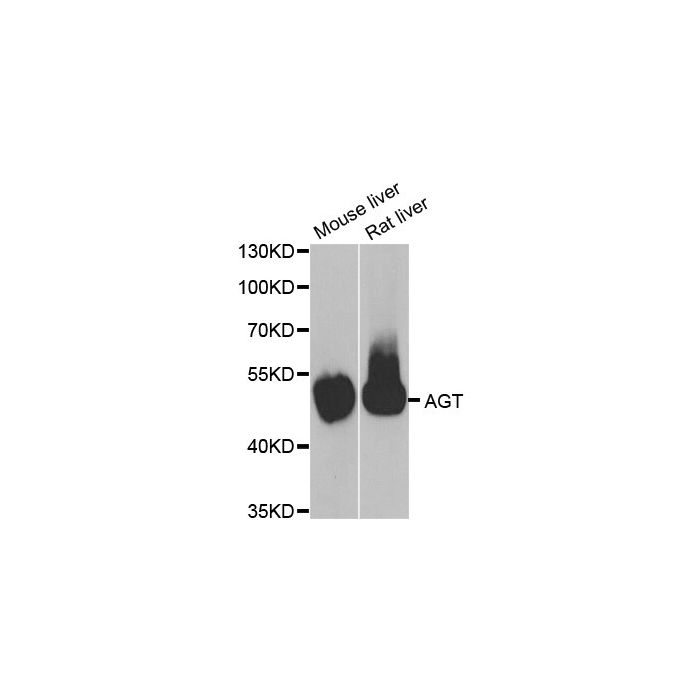AGT polyclonal, anti-human, mouse
€388.00
In stock
SKU
BS8097
Background:
Angiotensin is formed from a precursor, angiotensinogen, which is produced by the liver and found in the a-globulin fraction of plasma. The lowering of blood pressure is a stimulus to secretion of Renin by the kidney into the blood. Renin cleaves from angiotensinogen a terminal decapeptide, Angiotensin I (Ang I). This is further altered by the enzymatic removal of a dipeptide to form Angiotensin II (Ang II). Screening a panel of human-mouse somatic cell hybrids confirmed the assignment of the AGT locus to human chromosome 1. Angiotensin, an octapeptide hormone, is an important physiological effector of blood pressure and volume regulation through vasoconstriction, aldosterone release, sodium uptake and thirst stimulation. It has been shown that mechanical stress causes release of Angiotensin from cardiac myocytes and that Angiotensin acts as an initial mediator of the hypertrophic response. Angiotensin treatment also stimulates phosphorylation of Shc, FAK and MAP kinases and induces MKP-1, indicating stimulation of growth factor pathways. Angiotensin stimulation through AT1 has been shown to activate the JAK/Stat pathway involving a direct interaction between JAK2 and AT1 as demonstrated by co-immunoprecipitation.
Alternative Name:
Angiotensinogen, Serpin A8, AGT, SERPINA8
Application Dilution: WB: 1:500~1:2000
Specificity: AGT polyclonal antibody detects endogenous levels of AGT protein.
Immunogen:
Recombinant full length Human AGT.
MW: ~ 53 kDa
Swis Prot.: P01019
Purification & Purity:
The antibody was affinity-purified from rabbit antiserum by affinity-chromatography using epitope-specific immunogen and the purity is > 95% (by SDS-PAGE).
Format:
1mg/ml in PBS with 0.1% Sodium Azide, 50% Glycerol.
Storage:
Store at 4°C short term. Aliquot and store at -20°C long term. Avoid freeze-thaw cycles.
For research use only, not for use in diagnostic procedure.
Angiotensin is formed from a precursor, angiotensinogen, which is produced by the liver and found in the a-globulin fraction of plasma. The lowering of blood pressure is a stimulus to secretion of Renin by the kidney into the blood. Renin cleaves from angiotensinogen a terminal decapeptide, Angiotensin I (Ang I). This is further altered by the enzymatic removal of a dipeptide to form Angiotensin II (Ang II). Screening a panel of human-mouse somatic cell hybrids confirmed the assignment of the AGT locus to human chromosome 1. Angiotensin, an octapeptide hormone, is an important physiological effector of blood pressure and volume regulation through vasoconstriction, aldosterone release, sodium uptake and thirst stimulation. It has been shown that mechanical stress causes release of Angiotensin from cardiac myocytes and that Angiotensin acts as an initial mediator of the hypertrophic response. Angiotensin treatment also stimulates phosphorylation of Shc, FAK and MAP kinases and induces MKP-1, indicating stimulation of growth factor pathways. Angiotensin stimulation through AT1 has been shown to activate the JAK/Stat pathway involving a direct interaction between JAK2 and AT1 as demonstrated by co-immunoprecipitation.
Alternative Name:
Angiotensinogen, Serpin A8, AGT, SERPINA8
Application Dilution: WB: 1:500~1:2000
Specificity: AGT polyclonal antibody detects endogenous levels of AGT protein.
Immunogen:
Recombinant full length Human AGT.
MW: ~ 53 kDa
Swis Prot.: P01019
Purification & Purity:
The antibody was affinity-purified from rabbit antiserum by affinity-chromatography using epitope-specific immunogen and the purity is > 95% (by SDS-PAGE).
Format:
1mg/ml in PBS with 0.1% Sodium Azide, 50% Glycerol.
Storage:
Store at 4°C short term. Aliquot and store at -20°C long term. Avoid freeze-thaw cycles.
For research use only, not for use in diagnostic procedure.
| Is Featured? | No |
|---|
Write Your Own Review

